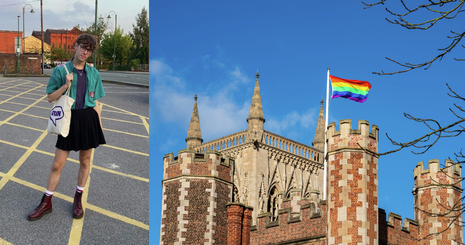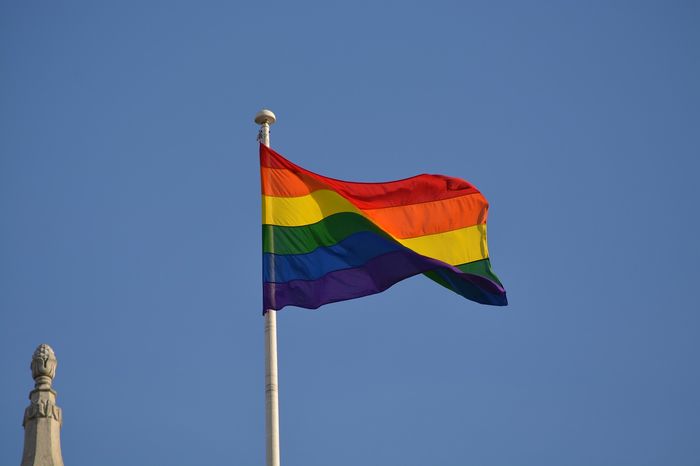Under the rainbow: Organising the Rainbow Ball
Juliette Fekkar interviews Oliver Cooney, the Rainbow Ball entertainment officer, discussing the University Rainbow Ball, queer spaces, and LGBT History Month in Cambridge

Note: This article uses queer as an umbrella term to refer to everyone that does not identify as straight
We sit comfortably in the St John’s buttery, our conversation almost drowned out by the loud conversations around us. Oliver sips his coffee slowly and listens, head slightly tilted, to each of my questions.
Oliver is beyond excited about organising the Rainbow Ball. After running for LGBT officer in St John’s with the idea of the Rainbow Ball, he received an invite from Chang Liu, the Student Union LGBT officer, to join the organising committee for the annual university-wide Rainbow Ball.
The ball, planned for 27 April, will be open to members of the LGBT community and allies. When I ask Oliver why students should be excited about the ball, he immediately knows his answer. It’s “the most fun event on the Cambridge calendar” he says, jokingly, because it “combines the expression of identities of the LGBTQ+ community with the razzle-dazzle of the Cambridge student experience”. The ball is both a “celebration of queerness at Cambridge” and an occasion for building more of an intercollegiate LGBT community.
“I want being queer to be a happier thing – I want it to feel like a victory”
Oliver’s experience organising it has been really “eye-opening”. He explains he has had to ensure the space was supportive of people of colour and accessible on a physical and sensory level. Intersectionality is fundamental: “It has to be an event for all queer people.”
His voice filled with energy, he sums up why he is involved with the ball: “Being queer is not all doom and gloom – it’s not all difficult relationships with our parents, or bullying in school”. Oliver remembers watching the documentary Paris is burning and thinking: “I want to do that... I want being queer to be a happier thing – I want it to feel like a victory.”
Coming from Manchester – the “gay capital of the UK” – Oliver didn’t know what to expect from Cambridge. But Cambridge didn’t disappoint: “Being queer feels so normalised here, which is great.”
“This shouldn’t be a non-queer space that they’ve let queer people into, but a place that can feel like my own”
Still, Oliver had always kept his studies and his queerness separate, partly out of fear that “if they knew this other side of me, they wouldn’t have let me in.” Oliver laughs and shakes his head as he tells me that his dad feared that his green hair would be frowned upon in Cambridge. His tendency to compartmentalise comes from the preconception of university as “serious and traditional”. Recently, Oliver started to work on “reconciling the academia and the queerness”. He wrote a supervision essay on queer dialect as a first step in accepting “he is all of these things”.
For Oliver, LGBT History Month and similar events are essential for queer people to “not feel like visitors”. Most importantly, he believes that queer people have a right to claim space in the University and feel like they belong. “This shouldn’t be a non-queer space that they’ve let queer people into, but a place that can feel like my own.”
Oliver believes the key is to find the intersection between celebrating queerness and “advancing the cause”. “If they’re flying the flag, are they also doing the work?” he says, pondering his own question. He smiles widely as he mentions the work done by LGBT Officers in John’s: getting colleges to fly the pride flag, making sure ents have gender-neutral bathrooms, organising LGBT formals and LGBT college families … “They do the fun stuff and the hard work,” he says cheerfully.
Our conversation shifts towards perceptions of queerness and Oliver explains how people categorising him leaves him feeling irritated. Often, they filter his reactions and only pick up on what fits the queer stereotype – trying to “push him into that box.” “There’s always going to be people who only see me as queer, and think they can sum up my entire personality and life in that one word.”
Oliver has dealt with stereotypes alongside deconstructing his own internalised homophobia. “When I see myself doing something very stereotypical, my initial reaction is ugh I don’t like that,” he makes a face and laughs, “but then I stop for a second and ask myself why don’t I like that.” A lot of times he finds that we perceive particular queer stereotypes negatively when we perceive queerness negatively.
At Cambridge, Oliver found himself unintentionally gravitating towards queer people. “It’s not a ‘gaydar’ because that’s a concept based on stereotypes – it’s because when you talk to some people you just get the sense that they get it, that you don’t have to explain yourself to them.” A queer space is much more than a space where queer people are, it’s a space that “allows you to deconstruct, a space where you can dress any way you please and explore different aspects of your own portrayal,” he concludes.
 News / Eight Cambridge researchers awarded €17m in ERC research grants27 December 2025
News / Eight Cambridge researchers awarded €17m in ERC research grants27 December 2025 News / Downing investigates ‘mysterious’ underground burial vault 29 December 2025
News / Downing investigates ‘mysterious’ underground burial vault 29 December 2025 Lifestyle / Ask Auntie Alice29 December 2025
Lifestyle / Ask Auntie Alice29 December 2025 Sport / Hard work, heartbreak and hope: international gymnast Maddie Marshall’s journey 29 December 2025
Sport / Hard work, heartbreak and hope: international gymnast Maddie Marshall’s journey 29 December 2025 Interviews / Meet Juan Michel, Cambridge’s multilingual musician29 December 2025
Interviews / Meet Juan Michel, Cambridge’s multilingual musician29 December 2025










